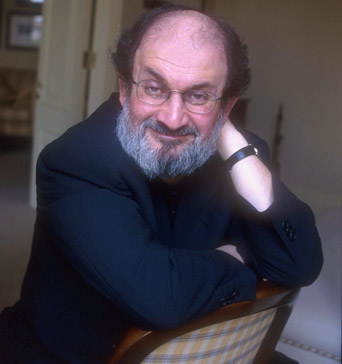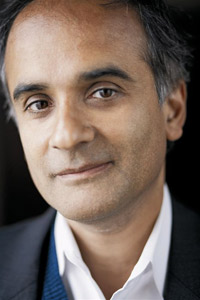Salman Rushdie to Discuss Enchantment
The Empire Writes Back

There’s something dubious about fiction writers whose major theme is storytelling. Though the practice dates back to Chaucer, and is studded with big modernist stars like Joyce and Borges (who often shone light on how darkly we are served by the stories we weave), it quickly decayed via Beckett, Barth, and Vonnegut’s jokes about themselves as Scheherazades, doomed to prattle. Nowadays, everybody’s in on the gag, from Stephen King to Will Ferrell. The net effect has almost turned metafiction into a thin funhouse narcissism.
Yet Salman Rushdie soldiers on.
The Indian-born, English-writing author-who will preview his new novel, The Enchantress of Florence, at Campbell Hall this weekend-is a house-approved storytelling storyteller. Though he’s more famous for being a literary refugee from Iranian holy men, he’s gotten critical respect in academia since the publication of Midnight’s Children (1981), with its semi-magical protagonist Saleem Sinai, a man born at the very moment India got independence. From the beginning of the novel, Rushdie’s hero complains of the vastness of intertwined narrations he must tell, stories that became milestones in the creation of postcolonial literature, a very hip English department specialty today. “It is well known the novel was highly credentialed,” wrote Bishnupriya Ghosh, a UCSB English professor, “winning the Booker of Bookers [an esteemed English literary prize] to make more visible the muscular oomph of postcolonial literatures no longer wedded to colonial preoccupations.” Rushdie was telling stories of people outside the Eurocentric ken: the rage of Caliban at not seeing his face in the mirror. Rushdie was, as postcolonial theorists sometimes put it, writing back.
Of course his wider fame derived from the fatwa Ayatollah Khomeini bestowed on him for his fourth controversial novel, The Satanic Verses. But even here he became a story, according to Ghosh: “Writer and public intellectual Salman Rushdie all too often evokes the dreaded fatwa : he becomes a political icon through which varied publics live their desires. Such unwonted fame effectively reduces Rushdie’s prodigious stature in the world of letters, where he is seen to have spearheaded an entire literary [with] Midnight’s Children.” For this reason, Rushdie doesn’t like to do many interviews.

In fact, his upcoming appearance at Campbell Hall on May 4 will probably be more of a reading than a conversation, according to sometime Santa Barbarian Pico Iyer, himself a champion of globalism and its far-flung souls, who will be onstage with Rushdie this weekend. “I don’t think we’ll be talking much,” Iyer said. “I believe he’s going to be delivering a lecture, so I will cross-question him for only a few minutes.”
Iyer thinks there will still be much to discuss. “Insofar as he is the leading voice, and literary creator, of globalism in its ongoing struggle against various fundamentalisms, I’m eager of course to find out how he sees that dialogue developing. Insofar as he has written songs with U2, appeared in commercial movies, and shown himself in league with everything new and even post-literary, I’d like to know whether he thinks the novel is dead, and what form he would use if he were getting started today. I’m even interested in how, having created a new literary form, he sees his many imitators and successors, in every medium. Perhaps we will even touch on what it means to be one of the literary world’s first ambassadors to the celebrity culture, and whether he thinks literature needs the spotlight to revive it-or in fact can claim the spotlight even while deploying its old-fashioned tools.”
And Rushdie uses a lot of tools, like magical realism, postmodern mixes of high and low, and especially the old-school tool of stories within stories. In Shalimar the Clown, his ninth of 10 novels, Rushdie writes a justification. “Everyone’s story is a part of everyone else’s.”
But are they? In The Enchantress of Florence, Rushdie tries to weave a fable into a history and knit the Italian Renaissance into Mughal India-the book includes six pages of bibliography. It’s a stretch. But it also includes what I think is a silent scream for help-a story of an artist so smitten with his creation that after long failing to breathe life into his painting, he succeeds in the opposite endeavor: disappearing from real life after painting himself into and underneath the frame of his work.
This is Rushdie: the man who became so famous for fiction resulting in forced isolation. Recently, John Updike attacked Rushdie’s frothy language, and the Nation offered mild exasperation at his over-fabling tendencies. Meanwhile, the real Rushdie has been busy wrapping stories inside stories and into a corner of the frame; he mainly stands for the right to tell stories. Maybe it’s time the old artificer got himself a life.
4•1•1
Salman Rushdie and Pico Iyer will speak at UCSB’s Campbell Hall on Sunday, May 4, at 4 p.m. For tickets or more information, call 893-3535 or visit artsandlectures.ucsb.edu.



